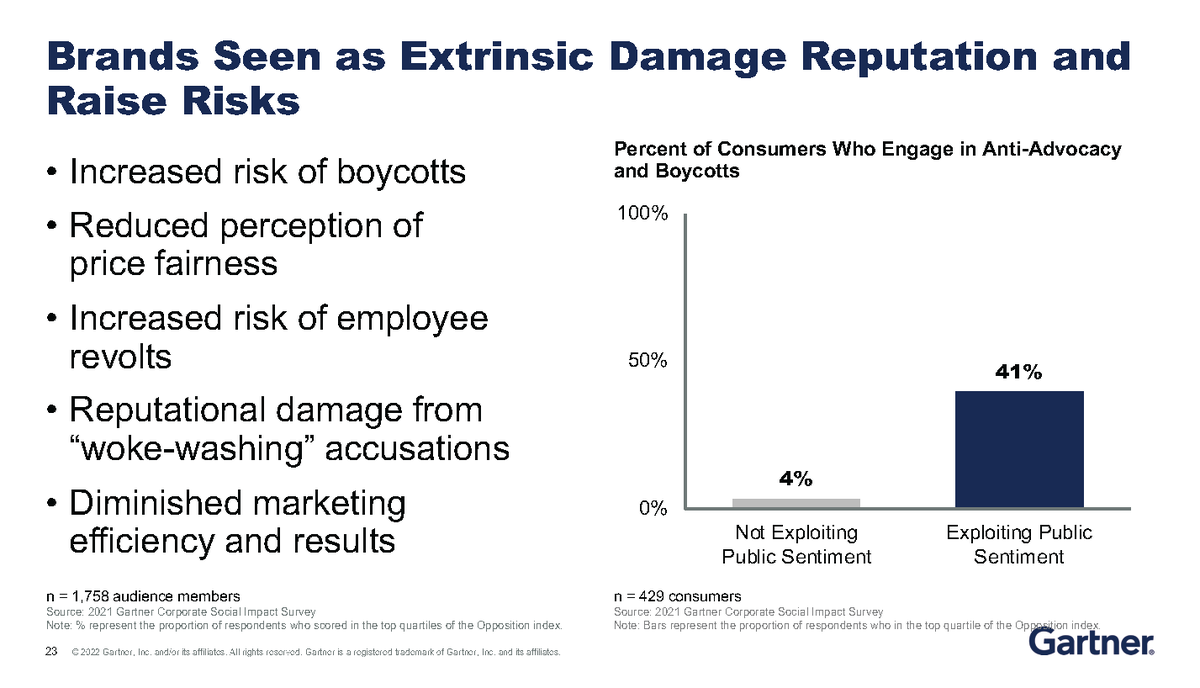
#GartnerMKTG | Happening Now: Do Corporate Social Justice Initiatives Drive Customer Acquisition?
Follow along for key takeaways.
Follow along for key takeaways.
We've been told we're entering a world of corporate social justice where brands must take stands to meet customer expectations. But a special Gartner research project found that many social justice initiatives are as likely to drive boycotts as "buycotts."
In this session, we'll explore the risks, opportunities, and activities that help marketing leaders to steer their brands through contentious issues in difficult times.
There are many reasons for your org to embrace social justice activities.
Social justice activities can:
✅ Affect investor preference & stock price
✅ Improve corporate culture
✅ Make it easier to attract & retain talent
✅ Be the right thing to do
Social justice activities can:
✅ Affect investor preference & stock price
✅ Improve corporate culture
✅ Make it easier to attract & retain talent
✅ Be the right thing to do
“One-third of employees report feeling more likely to want to work at a different organization that takes a stance on a social or political issue when their own organization is silent.”
Consumers are equally likely to "buycott" as boycott. "28% of consumers either buycotted or boycotted a brand because of their stance on social or political issues."
"Social justice issues are not primarily marketing opportunities but external environmental factors that demand consideration in your organization’s business strategy and operations."
It shouldn't stop there. Consumers are watching to see if you are taking a social stand to only make your brand look better. Follow through with real change. 

To reduce brand risk, understand that consumers primarily believe brands are just using social issues as a way to sell more of their products or services. Take action to drive genuine change within the org to avoid this extrinsic perception. 

It isn’t enough to make statements and donations. Activists and consumers are watching
for consistency in your org’s actions:
for consistency in your org’s actions:
- Composition of corporate boards & executive leadership
- Political contributions
- Leaders’ activities off the job
- Employees and leaders’ activities on the job
- Hiring practices and workforce diversity
- Corporate and store operations and policies
- Political contributions
- Leaders’ activities off the job
- Employees and leaders’ activities on the job
- Hiring practices and workforce diversity
- Corporate and store operations and policies
We recommend 3 "must-do" steps:
✅Evaluate your org’s values, statements and actions on sensitive issues of social justice to ensure alignment.
✅Identify gaps between values and actions.
✅Educate leaders and employees on their roles in reflecting values and closing gaps.
✅Evaluate your org’s values, statements and actions on sensitive issues of social justice to ensure alignment.
✅Identify gaps between values and actions.
✅Educate leaders and employees on their roles in reflecting values and closing gaps.
4 "should-do" steps include: (1/2)
✅Study your customers preferences, expectations and actions.
✅Monitor social media and other Voice of the Customer channels for changes in attitudes or brewing reputational issues.
✅Study your customers preferences, expectations and actions.
✅Monitor social media and other Voice of the Customer channels for changes in attitudes or brewing reputational issues.
(2/2)
✅Inform leaders of social justice opportunities and weak spots based on customer feedback.
✅Prepare frontline employees with talking points, scripts and guidance for how to deal with sensitive situations.
✅Inform leaders of social justice opportunities and weak spots based on customer feedback.
✅Prepare frontline employees with talking points, scripts and guidance for how to deal with sensitive situations.
Finally, we recommend 6 "may-do" steps: (1/3)
✅Evaluate your brand’s starting position in terms of commitment and identity.
✅Consider risks and opportunities of bringing social justice themes into your brand identity.
✅Evaluate your brand’s starting position in terms of commitment and identity.
✅Consider risks and opportunities of bringing social justice themes into your brand identity.
(2/3)
✅Recognize the potential for backlash and prepare the organization.
✅Test messaging before deploying campaigns.
✅Recognize the potential for backlash and prepare the organization.
✅Test messaging before deploying campaigns.
(3/3)
✅Iterate your corporate policies as you gain experience and conditions change.
✅Stay the course. Remain agile without overreacting.
✅Iterate your corporate policies as you gain experience and conditions change.
✅Stay the course. Remain agile without overreacting.
Key Issue Take-Away: Marketing must lead on social justice issues — not just what the brand says but in ensuring the brand is seen as making a genuine difference. #GartnerMKTG 

• • •
Missing some Tweet in this thread? You can try to
force a refresh







